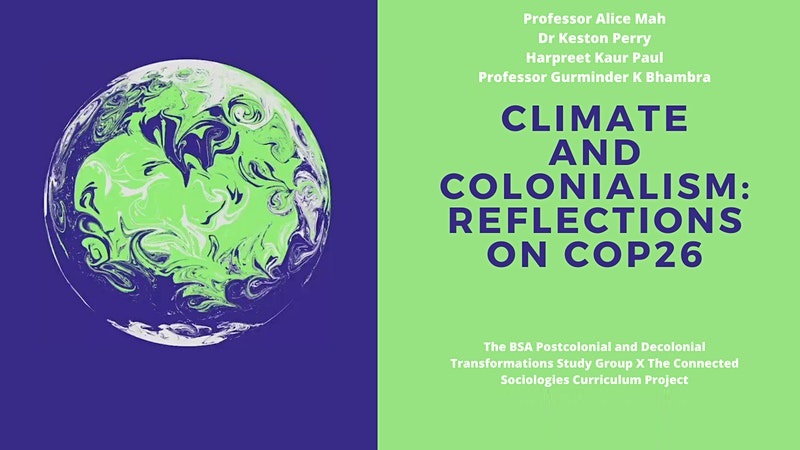Climate and Colonialism: Reflections on COP26
Thu, 27 Jan 2022 14:00 - 15:30 Greenwich Mean Time (UTC±0)
Register here.
This event will reflect upon COP26, specifically regarding the often ignored relationship between climate change and colonialism.
About this event
COP26 saw policymakers and government officials come to Glasgow to discuss the climate crisis. Yet, these discussions were dominated by political rhetoric, as little of substance was achieved. Such inactivity contrasts with the immediacy of the crisis. This is compounded for many of those living in the Global South, who are faced daily with the urgency of climate change. At the same time, Western powers often ignore the colonial dynamics of these processes. This event responds to these absences and erasures through offering reflections on COP26 in the context of the longer histories of colonialism.
Give the gift of hope
We practice what we preach:
accurate, fearless journalism. But we can't do it alone.
- On the ground in Gaza, Syria, Israel, Egypt, Pakistan, and more
- Our program trained more than 100 journalists
- Calling out fake news and reporting real facts
- On the ground in Gaza, Syria, Israel, Egypt, Pakistan, and more
- Our program trained more than 100 journalists
- Calling out fake news and reporting real facts
Join us.
Support The Media Line. Save democracy.
Speakers
Alice Mah is Professor of Sociology at the University of Warwick, with research interests in environmental justice, corporate power, anti-colonial ecologies, and the politics of industrial transformations. She is the author of Industrial Ruination, Community, and Place; Port Cities and Global Legacies; and (with Thom Davies) Toxic Truths: Environmental Justice and Citizen Science in a Post-Truth Age. Her next book, forthcoming with Polity Press, is Plastic Unlimited: How Corporations are Fuelling the Ecological Crisis and What We Can Do About It.
Keston K. Perry is Assistant Professor of Africana Studies at Williams College USA. His work examines the role of race in climate change, its policy implications and the financial system that underpins international climate policy that reproduces marginalization and coloniality specifically in the Caribbean and African diaspora. Dr. Perry’s work appreciates the ways in which global institutions and governing arrangements further expose Black and racialized communities in the Caribbean to acute dispossession, debt and death within the context of the climate crisis. This work makes the case for climate reparations to advance social justice and self-determination of Caribbean peoples. In 2021, Dr. Perry was briefly an Economic Affairs Officer and consultant at the Macroeconomic and Development Policies Branch, at the United Nations Conference on Trade and Development (UNCTAD), Geneva. He also previously was a postdoctoral scholar at the Climate Policy Lab, Fletcher School of Law and Diplomacy, Tufts University.
Harpreet Kaur Paul organized her first petition against systemic racism in policing when she was 11 and attended her first protest in 2002, against war in Iraq. She has participated in many protests since. She is a nonpracticing solicitor and previously worked at REDRESS, Amnesty International, and People & Planet. Most recently, she’s been raising her daughter, researching for a Ph.D. on climate justice at Warwick Law School, and writing – including the Common Wealth report “Towards Reparative Climate Justice,” co-editing and co-curating, the illustrated book “Perspectives on a Global Green New Deal,” with Dalia Gebrial (and co-hosting a podcast based on it too). Last year she co-launched Tipping Point UK, a climate justice movement-building organization. She also organizes with the Wretched of the Earth collective and supports loss and damage climate advocacy as a consultant with organizations like ActionAid.
Chair:
Professor Gurminder K Bhambra is Professor of Postcolonial and Decolonial Studies at the University of Sussex. Among her publications are Rethinking Modernity: Postcolonialism and the Sociological Imagination, Connected Sociologies, and Colonialism and Modern Social Theory (with John Holmwood). She is Project Director of the Connected Sociologies Curriculum Project, President of the British Sociological Association, and editor of Discover Society and Global Social Theory.
This event is hosted by the British Sociological Association‘s postcolonial and Decolonial Transformations study group and the Connected Sociologies Curriculum Project.
The Connected Sociologies Curriculum Project is funded by the Sociological Review Foundation.



